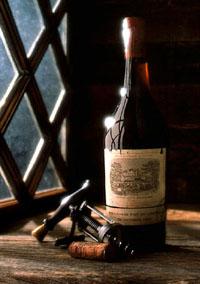Advantages and disadvantages of wine
Good for the cardiovascular system?
Some scientists believe that the benefit of wine in the cardiovascular system is because it contains acetylsalicylic acid. The wine, like aspirin, contains this acid (11-21 milligrams per liter) and the substances obtained from its degradation: dihydroxybenzoic acid 2.3 (21-26.5 mg/l) and dihydroxybenzoic acid 2.5 (22-28.5 mg/l). Half a liter of wine contains both acetylsalicylic acid and aspirin taken daily to keep the cardiovascular system healthy.

It should not be forgotten that cholesterol is the one that causes the most infarction and that wine benefits cholesterol, according to some authors. Some believe that wine protects the LDL part of cholesterol (bad cholesterol) from oxidation of free radicals, that is, it would paralyze the process of arteriosclerosis that produces a heart attack. This would be because the wine contains molecules called polyphenol, but its operation is little known. Smaller molecules are absorbed into the intestine and do not know what happens to large ones. In a recent study, the cholesterol levels of volunteers who have drunk wine with very little alcohol (3.5?) have not increased.
However, some researchers claim that alcohol is transformed into acetate in the liver and at the same time a reduction of dinucleotic nicotinamide-adenine (NAD) is synthesized that would help the antioxidant role of polyphenols. Thus, alcohol would increase the concentration of HDL or "good" cholesterol.
In abusive consumers of saturated fatty acids, mortality is high due to cardiovascular problems. The lowest rate in the world is in Japan and France, and the data from the latter state is surprising, as sauces are eating. Some epidemiologists believe they are released because they drink wine. Serge Renaud, from INSERM in Lyon, says that 76% of the deaths due to heart attack are due to lack of wine. In France, however, 36-42% of fats eat calories and consume 36 grams of alcohol per person per year. Too much, of course. Therefore, in addition to breaking all the brands of deaths by accident, they have one of the highest cancer mortality rates in the world, 20% more than in the United States. Women who drink two or three glasses a day are at higher risk for breast cancer.
Therefore, food experts consider it beneficial for men to drink two glasses of wine a day and for women to drink a glass of wine a day (referring to those who have no problems with alcohol, even a drop is harmful to alcoholics). In a survey conducted in Britain by 12,000 physicians, the mortality rate from moderate drinkers is 30% lower than that of non-drinkers.
Hepatitis A is often contracted by oysters. However, in 1992, a group of scientists from the USA showed that by drinking two glasses of wine along with oysters the risk was 90 percent lower. Similar results are obtained with alcohol.
On the other hand, passengers usually have diarrhea when they travel to other countries, which are those below the "tourist". Drinking red or white wine is good to avoid this disease. It seems that alcohol itself does not have a beneficial effect, but polyphenols that neutralize the three most typical bacteria that cause diarrhea. When you go away, therefore, during the meal you drink a forest or two white or red wines and you will take care of yourself.
Many believe that red and white wine are equal in food, but it is not true. They are different because the process of obtaining both types of wine is also different. When the rosé wine is made, the grapes are kept in the container with the skin, the pipe, but when the white wine is made the solid parts are removed at first. However, grape polyphenols are found in the skin and in the nuggets and when macerated large concentrations of polyphenol are obtained. White wines therefore have low concentrations of polyphenol.
Beneficial for wine
The fungus Botryris cinerea rots the grapes bunches to produce fine white wines. Therefore, the fungus is usually dignified. However, the fungus has resisted the two main families of fungicides (benzimidazoles and cyclic imides) and it is convenient that the vine itself has a natural weapon anti-fungus. This weapon is called "resveratrol" and is synthesized by the vine itself. Resveratrol is a phenolic compound belonging to the phytoalexins family. Researchers from the French laboratories Jules Guyot have shown that the synthesis of resveratrol in the black mahatsondo of Borgónia is driven by the aluminum salts contained in the product Synermis. This product is used to increase the influence of Rovral fungicide.
However, resveratrol has another virtue. It protects from cardiovascular diseases and its presence in red wine would favor.
Published in 7K
Buletina
Bidali zure helbide elektronikoa eta jaso asteroko buletina zure sarrera-ontzian











